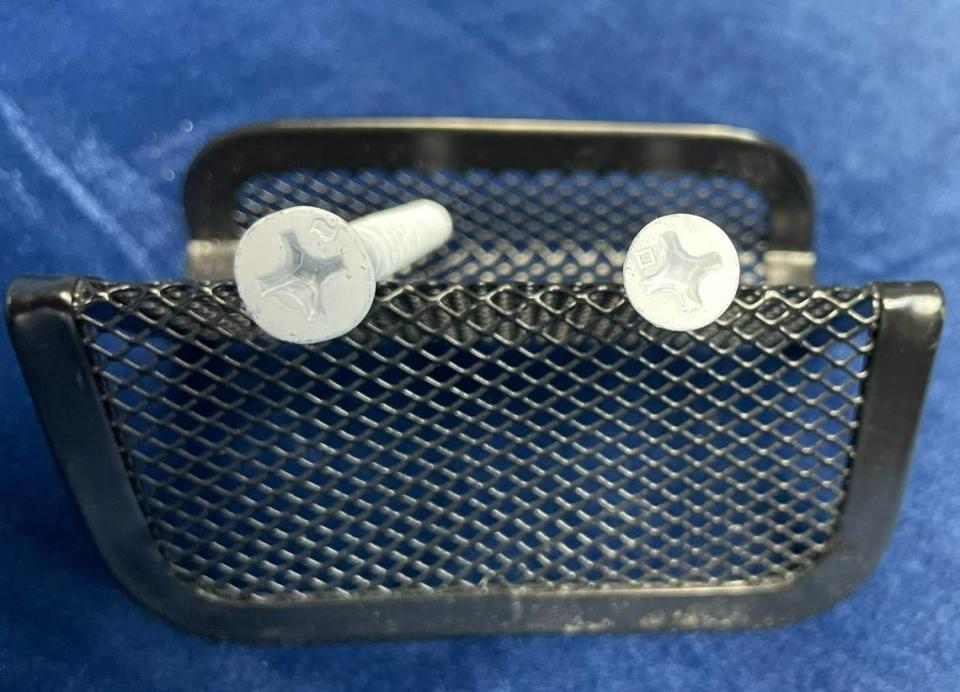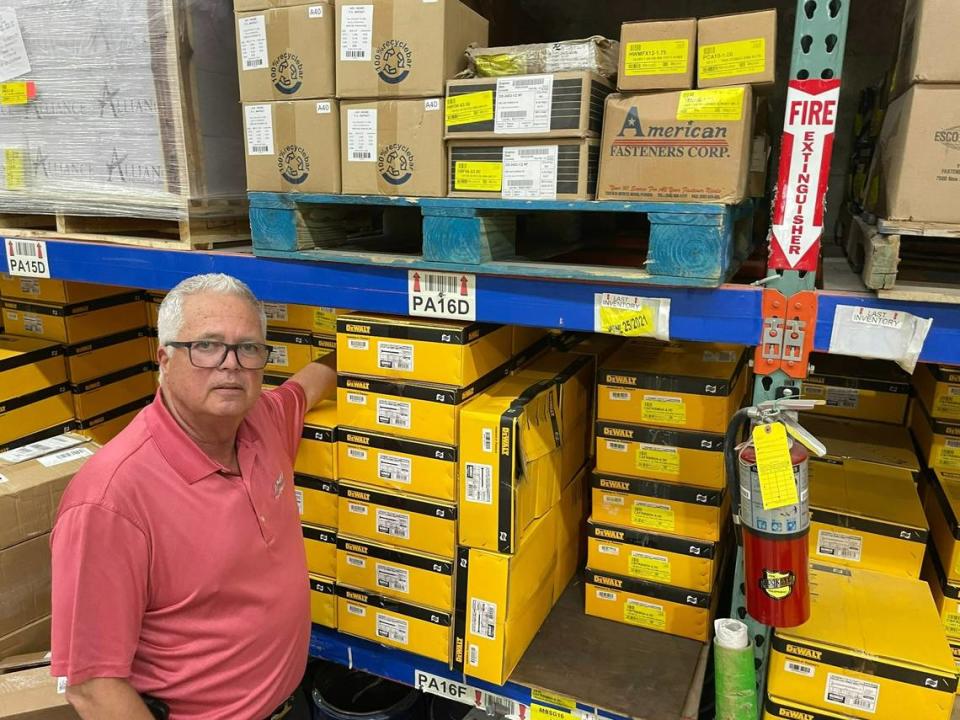Black & Decker’s warning: ‘Counterfeit’ screws don’t meet Miami-Dade storm standards
- Oops!Something went wrong.Please try again later.
The white screws sold last year in the Hialeah area measured nearly three inches long and carried a familiar name for window installers: Ultracon, a line of Stanley Black & Decker products that meet the rigorous standards Miami-Dade County requires to make homes resistant to hurricane damage.
One problem that was hard to notice: Stanley Black & Decker didn’t actually manufacture them and claimed in a cease-and-desist letter to Manny’s General Fasteners in late 2022 that the “counterfeit” screws failed testing and “are not up to minimum local code requirements.”
READ MORE: A guide to preparing for the 2023 hurricane season
“Because of the risk that Manny’s fasteners poses to the public, a copy of this letter is being sent to Miami-Dade County,” Kofi Schulterbrandt, a patent attorney for Stanley Black & Decker, wrote in the Dec. 29 letter to Manny’s owner Manuel Sanchez.
Nearly five months later, Miami-Dade’s Building Department sent a notice to municipal inspectors across the county alerting them to the possibility of bogus Ultracon screws, which Stanley Black & Decker said were used in local window installations.
“Although Manny’s General Fasteners Corp. has cooperated by discontinuing the sale of these screw anchors, there may still be some of these out there being installed,” the May 11 letter reads.
On sale since last year
It’s not known how many of the imitation Ultracon screws were sold since Manny’s first shipment of the fasteners arrived in its Medley store from a factory in Taiwan in 2022.
Miami-Dade’s regulatory arm said Wednesday that by the time it received the Stanley Black & Decker notice needed to take action this spring, Manny’s had stopped selling the imitation Ultracon screws and told a county inspector during an unannounced store visit that only the approved fasteners were for sale.
“County inspectors have also been actively advising installers in the field to be on the lookout for these anchors,” wrote Lorna Mejia-Lopez, spokesperson for Department of Regulatory & Economic Resources, which oversees building regulations. “RER has not received any notice or specific complaints from code officials or others about the usage of the counterfeit anchor in storm-window projects.”

Waqar Ali, owner of a Doral lab that tests building materials for Miami-Dade’s hurricane standards, said installing imitation Ultracon screws would leave homeowners guessing about whether their storm windows were ready for future hurricanes.
“If they were actually Ultracons, you can feel great,” said Ali, president of Hurricane Engineering and Testing. “If they’re not, you have no idea what you have.”

Stanley Black & Decker hasn’t shared its testing results with Miami-Dade or responded to inquiries from the Miami Herald. Without those testing results, Miami-Dade regulators say they can’t determine whether the imitation screws would represent a long-term problem for homeowners.
“RER is attempting to obtain testing performed on the counterfeit anchors. Such testing is needed to determine the extent of impact on the performance,” Mejia-Lopez wrote. “To the extent that there are deviations from approved products and methods, performance can be — but is not necessarily — impacted. The specific extent of that impact, however, is unknown without the benefit of test results.”
Representatives of Manny’s say distribution was mostly limited to contractors in the Hialeah area. They said the store, which sits just outside Hialeah, distinguished between the imitation screws and the actual Ultracon fasteners made to meet Miami-Dade’s building-code standards.
The store’s lawyer linked the imitation screws to a misunderstanding of Ultracon’s status as a trademarked brand rather than a generic term for concrete screws.
“If the contractor says, ‘Oh, I just need any Ultracon,’ our client gives them the regular Ultracon screws that are understood” by the contractor not to be code compliant,” said Chris Sanchelima, a Miami lawyer representing Manny’s. “The contractors at all times know what they’re buying.”
The standards for hurricane-resistant materials
At the heart of the friction over fake Ultracon screws is the confidence that’s supposed to come from materials that meet Miami-Dade standards for hurricane resilience.
After 1992’s Hurricane Andrew ravaged newly built homes in what was then Dade County, local administrators created strict building codes and requirements for construction materials.
Makers of building materials must submit testing results on both strength and resistance to corrosion, and the “Dade County approved” standard became a national benchmark for Stanley Black & Decker and other manufacturers.
But requiring county-approved screws doesn’t mean they will be installed.
In a Sept. 19 email to the head of Miami-Dade’s building-product division, a sales representative for Stanley Black & Decker warned that an unnamed company was improperly selling imitation DeWalt fasteners, a family of screws that includes the Ultracon brand.
“This product is being sold in large quantities in the Miami market and going into window systems that require code-approved anchors,” wrote Josh Babb, the Southeast sales manager for Christy Associates, in one of several emails provided to the Herald by Miami-Dade. “It would be greatly appreciated if you could assist in making the local inspectors aware that this is not our branded code-approved product.”
The division director, Jaime Gascon, replied to Babb that he was forwarding the email to a team that would follow up for more details, and requested any cease-and-desist letter Stanley Black & Decker may have sent to the seller of the bogus screws.
Three months later, on Dec. 27, Stanley Black and Decker sent its cease-and-desist letter to Manny’s.
While Stanley Black & Decker said it was sending a copy of that letter to Miami-Dade, Mejia-Lopez said it wasn’t emailed until three months later. She said county administrators had pressed company representatives to fill out complaint forms needed to trigger regulatory action on issues with approved building materials, but that the paperwork wasn’t filed.
Sanchelima, the Manny’s lawyer, said homeowners shouldn’t worry because the store’s clients have to request screws from staff to purchase them. Any installers needing screws meeting Miami-Dade standards would have asked for “DeWalts” not “Ultracon,” he said.
“If you ask for the one that’s code complaint, you would ask for the Dewalt-branded screws,” he said.
Hialeah-area customers
Elsa Hernandez, a Manny’s manager who joined Sanchelima for the interview, said she estimated 20 installers may have purchased the imitation Ultracon screws and that the product likely did not travel far.
“Most of the people who buy from [Manny’s] are people who work in Hialeah,” she said. “Most of the homes would be installers who work around Hialeah.”
As recorded in Miami-Dade’s roster of hurricane-approved products, Ultracon screw heads are stamped with a tiny curved parallelogram designed to resemble a flag. The Manny’s screws sold as Ultracons were stamped with a square.
In its May 11 notice to inspectors, Miami-Dade’s Gascon repeated Stanley Black & Decker’s statement that the Manny’s screws had markings “that are not easily distinguishable from the genuine DeWalt Ultracon masonry screw anchor.”

For homeowners who paid for window installations, confirming the screws used met Miami-Dade code can be challenging.
Installation screws often are not visible once the job is completed. Inspectors — from the county if outside city limits, or from a municipality — should be confirming the use of authorized building materials. But differences between similar marks could be missed, said Ali, the testing-lab owner.
“When the inspectors go and look at how a window was installed, they are looking at those flags,” he said. “That’s how the building inspector can tell that the approved screws are used. If you have a mark, you can’t tell if it’s a square or a flag.”
Manny Benitez owns American Fasteners Corp. in Doral, a larger competitor to Manny’s. He said he started losing a few sales last summer from contractors purchasing fasteners from Manny’s. He said Manny’s was selling the Ultracon product to installers for a few dollars less than American charges.
“I said: ‘Wait a minute. How is he able to sell them at these prices?’ ” Benitez said during a tour of the American Fastener warehouse, where boxes of Dewalt Ultracon screws are stacked on shelves 20 feet high. “Screws are not that profitable. We have to sell millions of them to make any money.”
Two days after Babb, the DeWalt sales representative, sent his Sept. 19 email to Miami-Dade’s building office, American Fasteners issued its own warning on social media.
Over footage of a bag of imitation “Ultracon” screws purchased from Manny’s, the Instragram video began with the title “Beware of counterfeit screws!” and pointed out the fasteners lacked Stanley head markings and the bag label didn’t carry Miami-Dade’s “approved” logo.
“Don’t get fooled!” the post stated.

